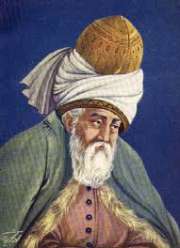|
Biografie Jalal ad-Dīn Muhammad Rumi
Jalāl ad-Dīn Muḥammad Balkhī, also known as Jalāl ad-Dīn Muḥammad Rūmī, and popularly known as Mowlānā but known to the English-speaking world simply as Rumi (30 September 1207 – 17 December 1273), was a 13th-century Persian (Tajik) Muslim poet, jurist, theologian, and Sufi mystic. Rūmī is a descriptive name meaning "the Roman" since he lived most of his life in an area called Rūm because it was once ruled by the Eastern Roman Empire.
It is likely that he was born in the village of Wakhsh, a small town located at the river Wakhsh in what is now Tajikistan. Wakhsh belonged to the larger province of Balkh, and in the year Rumi was born, his father was an appointed scholar there. Both these cities were at the time included in the greater Persian cultural sphere of Khorasan, the easternmost province of Persia, and were part of the Khwarezmian Empire.
Image of the Rumi on an old book in the Mevlâna museum; Konya, TurkeyHis birthplace and native language both indicate a Persian heritage. His father decided to migrate westwards due to quarrels between different dynasties in Khorasan, opposition to the Khwarizmid Shahs who were considered devious by Bahā ud-Dīn Walad (Rumi's father), or fear of the impending Mongol cataclysm. Rumi's family traveled west, first performing the Hajj and eventually settling in the Anatolian city Konya (capital of the Seljuk Sultanate of Rum, in present-day Turkey). This was where he lived most of his life, and here he composed one of the crowning glories of Persian literature which profoundly affected the culture of the area.
He lived most of his life under the Sultanate of Rum, where he produced his works and died in 1273 AD. He was buried in Konya and his shrine became a place of pilgrimage. Following his death, his followers and his son Sultan Walad founded the Mawlawīyah Sufi Order, also known as the Order of the Whirling Dervishes, famous for its Sufi dance known as the samāʿ ceremony.
Rumi's works are written in the New Persian language. A Persian literary renaissance (in the 8th/9th century) started in regions of Sistan, Khorāsān and Transoxiana and by the 10th/11th century, it reinforced the Persian language as the preferred literary and cultural language in the Persian Islamic world. Rumi's importance is considered to transcend national and ethnic borders. His original works are widely read in their original language across the Persian-speaking world. Translations of his works are very popular in other countries. His poetry has influenced Persian literature as well as Urdu, Punjabi and other Pakistani languages written in Perso/Arabic script e.g. Pashto and Sindhi. His poems have been widely translated into many of the world's languages and transposed into various formats. In 2007, he was described as the "most popular poet in America."
|





